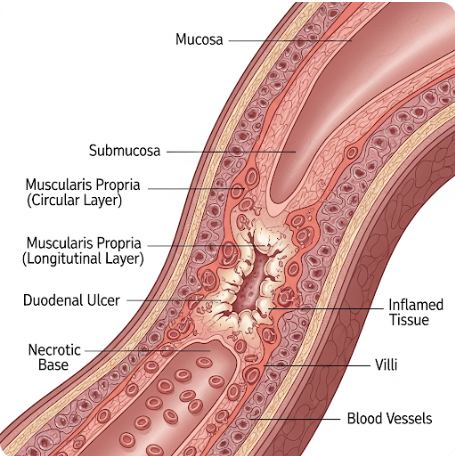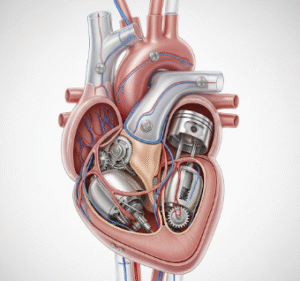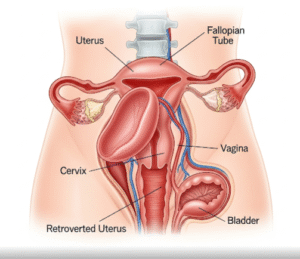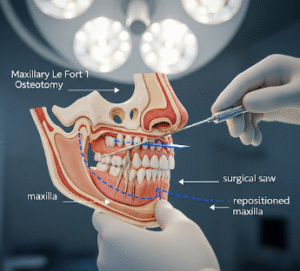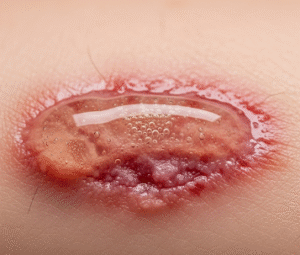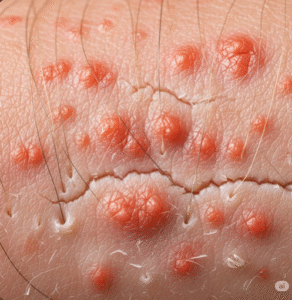Overview
Duodenal ulcers are sores that develop in the lining of the duodenum, the first part of the small intestine. In South Korea, duodenal ulcers remain a common gastrointestinal condition, often associated with Helicobacter pylori infection, long-term use of nonsteroidal anti-inflammatory drugs (NSAIDs), or lifestyle factors such as stress and diet. Early diagnosis and treatment are essential to prevent complications like bleeding or perforation.
What is a Duodenal Ulcer?
A duodenal ulcer is a type of peptic ulcer that forms when the protective mucosal lining of the duodenum is eroded, allowing stomach acid to damage the tissue. It can occur in individuals of any age but is more common in adults over 30. Untreated ulcers can lead to serious health issues such as gastrointestinal bleeding, perforation, or obstruction.
Symptoms
Common symptoms include:
- Burning or gnawing pain in the upper abdomen
- Pain that may improve or worsen with eating
- Nausea and vomiting
- Bloating and fullness
- Loss of appetite and weight loss
- Dark or black stools (indicating bleeding)
- Fatigue due to anemia from chronic blood loss
Causes
Duodenal ulcers are primarily caused by:
- Helicobacter pylori infection, which damages the mucosal lining
- Prolonged use of NSAIDs (aspirin, ibuprofen)
- Excessive stomach acid production
- Smoking and alcohol consumption
- Stress and certain dietary factors
Risk Factors
Factors that increase the risk of duodenal ulcers include:
- Infection with H. pylori
- Regular use of NSAIDs
- Smoking and excessive alcohol intake
- Family history of peptic ulcer disease
- Chronic stress or severe illness
Complications
Untreated duodenal ulcers can lead to:
- Gastrointestinal bleeding
- Perforation of the intestinal wall, causing peritonitis
- Obstruction of the digestive tract
- Anemia from chronic blood loss
Prevention
Preventive strategies include:
- Treating H. pylori infections promptly
- Limiting NSAID use and using protective medications when necessary
- Avoiding smoking and excessive alcohol
- Managing stress through relaxation techniques
- Maintaining a balanced diet and regular meals
Treatment Options in Korea
Duodenal ulcer management in South Korea combines medications, lifestyle modifications, and follow-up care:
Medical Management:
- Proton pump inhibitors (PPIs) to reduce stomach acid
- H2 receptor blockers to decrease acid production
- Antibiotics to eradicate H. pylori infection
- Antacids and protective medications for symptom relief
Lifestyle Modifications:
- Avoiding NSAIDs when possible
- Limiting alcohol and smoking
- Eating smaller, frequent meals
- Stress management techniques
Specialized Care:
- Gastroenterology departments in major Korean hospitals, including Seoul and Busan, provide endoscopic diagnosis and treatment
- Endoscopic procedures can address complications like bleeding or perforation
- Regular follow-ups ensure healing and prevent recurrence
With proper treatment and lifestyle adjustments, patients in Korea can effectively manage duodenal ulcers, reduce symptoms, and prevent complications.

